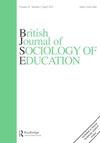Beyond bad behaviour? Towards a broader understanding of school student activism
IF 2.1
3区 教育学
Q1 EDUCATION & EDUCATIONAL RESEARCH
引用次数: 0
Abstract
Abstract This paper explores UK school students’ protest activism relating to their schools’ policies and practices, drawing on two datasets: 1) a newspaper analysis of media reports relating to school protests between 2000 and 2021; 2) a survey of 800 secondary school pupils in Wales. Drawing on social movements literature and adapting concepts for the school environment, we present a framework for exploring children’s protest repertoires that distinguishes between institutionalised, legitimated and disruptive forms of activism. Our analysis outlines trends in pupil protest activities and explores stated motivations for protesting. We find that pupils are using a broad range of protest actions, often in combination, to voice concerns about school-based issues. Our data also suggest that pupils link their grievances to wider themes of social justice, rights, fairness and solidarity. Using principles of critical pedagogy, our study challenges hegemonic and deficit-laden ideas about children’s (mis)behaviour as potential mis-readings of activism.除了不良行为?对学校学生行动主义有更广泛的了解
摘要本文利用两个数据集探讨了英国学生与学校政策和实践有关的抗议活动:1)报纸对2000年至2021年间与学校抗议活动有关的媒体报道的分析;2) 对威尔士800名中学生的调查。借鉴社会运动文献并根据学校环境调整概念,我们提出了一个探索儿童抗议剧目的框架,区分了制度化、合法化和破坏性的激进主义形式。我们的分析概述了学生抗议活动的趋势,并探讨了抗议的既定动机。我们发现,学生们正在使用广泛的抗议行动,通常是联合行动,来表达对学校问题的担忧。我们的数据还表明,学生们将他们的不满与社会正义、权利、公平和团结等更广泛的主题联系起来。利用批判性教育学的原则,我们的研究挑战了关于儿童(错误)行为的霸权和赤字观念,将其视为对激进主义的潜在误读。
本文章由计算机程序翻译,如有差异,请以英文原文为准。
求助全文
约1分钟内获得全文
求助全文
来源期刊
CiteScore
3.70
自引率
9.50%
发文量
74
期刊介绍:
British Journal of Sociology of Education is one of the most renowned international scholarly journals in the field. The journal publishes high quality original, theoretically informed analyses of the relationship between education and society, and has an outstanding record of addressing major global debates about the social significance and impact of educational policy, provision, processes and practice in many countries around the world. The journal engages with a diverse range of contemporary and emergent social theories along with a wide range of methodological approaches. Articles investigate the discursive politics of education, social stratification and mobility, the social dimensions of all aspects of pedagogy and the curriculum, and the experiences of all those involved, from the most privileged to the most disadvantaged. The vitality of the journal is sustained by its commitment to offer independent, critical evaluations of the ways in which education interfaces with local, national, regional and global developments, contexts and agendas in all phases of formal and informal education. Contributions are expected to take into account the wide international readership of British Journal of Sociology of Education, and exhibit knowledge of previously published articles in the field. Submissions should be well located within sociological theory, and should not only be rigorous and reflexive methodologically, but also offer original insights to educational problems and or perspectives.

 求助内容:
求助内容: 应助结果提醒方式:
应助结果提醒方式:


